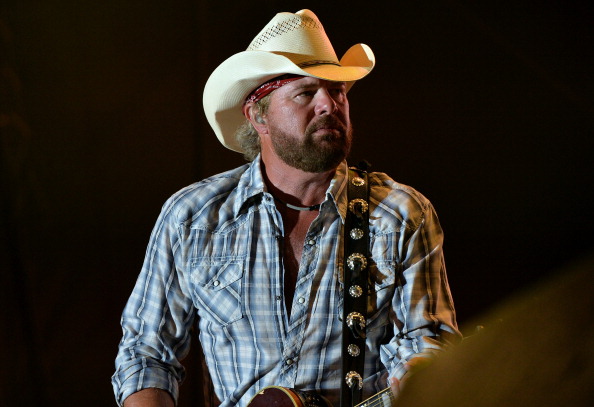
When America was attacked 14 years ago, it sent a massive shockwave throughout the country. Americans were stunned after Al-Qaeda’s attack on the World Trade Center and, naturally, several musicians tried their best to capture exactly what that shock felt like. Many artists — even some of the best songwriters of all-time — tried and failed to write something poignant in the wake of 9/11. Paul McCartney couldn’t think of anything better than his banal “Freedom,” which might be the worst song he ever wrote, while all Neil Young could muster up was “Let’s Roll,” a clumsy attempt to turn Todd Beamer’s famous quote into an action hero’s catchphrase. That said, no song written in the aftermath of 9/11 is more infamous than Toby Keith’s “Courtesy of the Red, White and Blue (The Angry American).”
When someone says they hate Toby Keith, what they really mean is they hate this song. When an episode of Family Guy about Peter becoming excessively patriotic includes a joke about him sacrificing a goat to Toby Keith, it’s because of this song. When Keith appeared as a guest on The Colbert Report to let us know he was in on the joke, it was because of this song. For better or worse, it’s come to define him as an artist. The song likely won him plenty of new fans, but it also permanently painted him as a war-mongering jingoist who represented everything negative about America, and its collective reaction to the attacks.
Many people hate this song, but it’s interesting to consider why it’s loathed so much. Sure, in retrospect, it comes off as excessively bloodthirsty. But let’s be honest — if Keith was just one random redneck wingnut who was far more violent than the rest of us, this song wouldn’t mean anything. No, “Courtesy of the Red, White and Blue” represents the angry, violent reaction many of us had to the attacks. And, in retrospect, maybe a large portion of us who had that reaction feel bad about it. Not because we wanted revenge – that made sense – but because that desire for revenge often manifested itself with ignorance and Islamophobia. The difference is that whatever ugly words may have spewed out of our mouths in the days and weeks following 9/11 have vanished into the air. Keith’s lyrics will stick for life.
The first musical response to 9/11 came from another country artist, Alan Jackson, who gave us “Where Were You When the World Stopped Turning.” The song was released in November 2001 and quickly began dominating country airwaves. That song tried its damndest to frame 9/11 in the perfect context and to be a piece of living history, but it might have tried a little too hard. For all of its faux-poetic musings about talking to God and watching I Love Lucy reruns, it just felt artificial, which is why South Park‘s famous “Ladder to Heaven” parody rang so true. But if Jackson’s problem was trying too hard to be poetic, Keith’s was that he didn’t try hard enough. He simply told the world exactly how the attacks made him feel. Specifically, they made him feel like putting a boot in the enemy’s ass.
In a way, Keith succeeded where Jackson failed; he wrote the quintessential, time-capsule 9/11 response song. When I think of the attacks, the first song I think of is not “Where Were You When the World Stopped Turning,” or even Bruce Springsteen’s “The Rising.” No, it’ll be “Courtesy of the Red, White and Blue.” Not because it’s the perfect, elegant response to 9/11 that we all wanted, but because, for better or worse, it perfectly captures the enraged, violent, let’s-get-the-bastards-who-did-this reaction to 9/11 that so many of us had.
Just to be clear, I’m not denying the many problems with this song that have been articulated over the years. No, it’s every bit as violent, jingoistic, and ignorant as every other bleeding heart says it is. But it’s also a remarkably honest, direct piece of work. And if we’re being honest with ourselves, the vast majority of Americans had thoughts and feelings after 9/11 that are remarkably similar to what Keith expressed here. Naturally, as we collectively calmed down, many of us have come to regret some of those feelings, and that’s a good thing. The problem is, we’ve turned Toby Keith into a scapegoat. If you want to hate this song, hate it, but be honest about why you hate it. Chances are, it’s not because Keith was uniquely bloodthirsty in his response to the attack, but rather because he was commonly bloodthirsty, and reflecting on that makes you feel uncomfortable.






